Digging for diversity in diamond rich Botswana
- Published
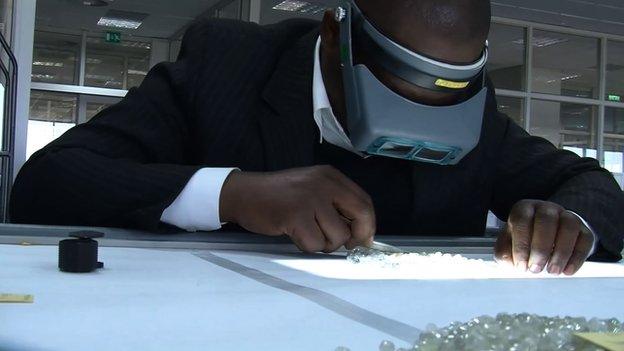
Diamond production continues to dominate Botswana's economy
In Africa, Botswana is often seen as a diamond in the rough.
It's perceived as the least corrupt country, with the longest surviving multiparty democracy on the continent, and boasts one of the world's fastest-growing economies.
But, following the global economic downturn in 2008, and increasingly volatile commodity prices, the country's reliance on diamonds has come into question.
For the first time Botswana finds itself cash strapped, in negative growth, and having to go to international donors.
The country is looking to diversify its economy by strengthening existing sectors like tourism and cattle farming, and investing in burgeoning industries spawning from technology and entrepreneurship.
Yet diamonds by far outshine any other industry in Botswana, accounting for one-third of GDP, 70% of export earnings, and about one-third of the government's revenues.
However, production has peaked, and experts believe reserves of the precious stone may run out by 2030.
Unemployment is also on the rise, with official jobless rates nearing 20%, and an estimated 45% of Botswana's population living below the poverty line.
Economic growth was also negative in 2009, and the industrial sector shrank by 30%.
Signs of labour unrest have also began showing following public sector strikes in recent years.
As Linah Mohohlo, who has been governor of the Bank of Botswana for 15 years, put it in a recent interview with BBC Africa Business Report: "It is a serious concern to government, for many years now strategies have been put in place to diversify the economy away from mining."
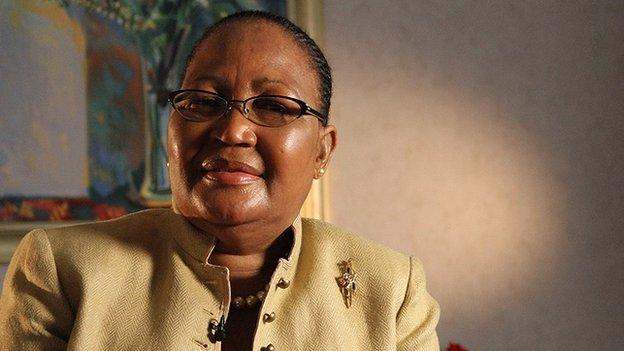
Ms Mohohlo says Botswana is widening the number of minerals it extracts
Rough neighbourhood
In many ways Botswana is seen as becoming a victim of its own making.
Policies have favoured and protected the diamond industry, and strategies and institutions that assisted and protected its growth for decades have made implementation and expansion of newer, alternative industries difficult.
The strong role of the state in the economy, plus bloated bureaucracy, often also makes it difficult for investors to enter the market.
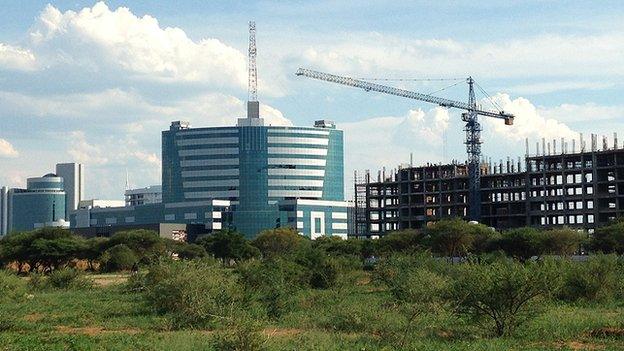
Despite economic concerns, Botswana's capital Gaborone is seeing continuing construction work
Most contracts are also government sponsored, making it hard for entrepreneurs to set up shop and compete.
Despite being in the relatively stable southern African region, an electricity crisis in South Africa, and political uncertainty in Zimbabwe makes it a bit of a rough neighbourhood.
In response Ms Mohohlo says she's more worried about competition from the country's neighbours, especially for foreign direct investment, and says Botswana needs to "sharpen its pencils".
The manufacturing industry, for example, has "not done what we expected it to do", she says. The sector accounts for an estimated 5% of Botswana's GDP, and employs more labour than mining.
In addition, Botswana has a small domestic market of only two million people and having to compete head-to-head with South Africa is a challenge.
'Disadvantage'
Botswana needs to come up with unique enterprises to compete effectively with South Africa, says Dr Tebogo Seleka, executive director of the Botswana Institute for Development Policy Analysis (Bidpa).
"We are both in SACU (Southern African Customs Union), that means goods can enter freely, so if we chose those enterprises that South Africa is more competitive at, that puts us at a disadvantage," he says.
The key to Botswana's future diversity, many believe, lies in private sector development, and attracting foreign direct investment.
Dr Seleka also believes that due to the country's proximity, combined with its diminutive population, investors tend to set up shop next door.
Cattle outnumber humans in Botswana by over one million
"If a firm from overseas wants to locate in southern Africa, because of Botswana's market size we are at a disadvantage," Dr Seleka says.
"We also need to look at technology readiness, if you look at the types of technologies firms use, and the rate of adoption of new technologies in Botswana it is still not up to scratch."
Cattle farmers
One of the solutions to beefing up diversity in the country's economy may lie with its most abundant animal population.
Cattle outnumber the human population by over a million, and beef is the country's third-largest earner.
But despite this, agriculture, in its entirety, only makes up 3% of Botswana's economy.
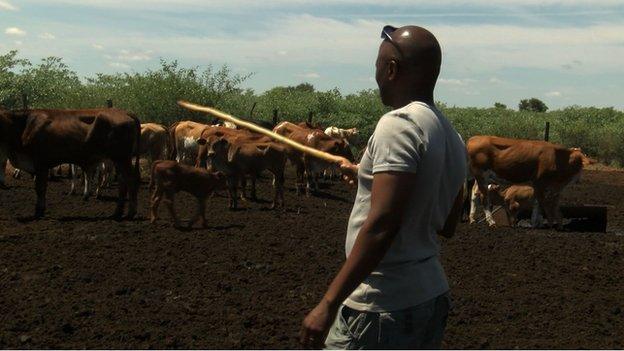
Bakang Tsheboagae wants an easier way to count his cattle
Bakang Tsheboagae, a cattle farmer from Dutlwe, a village in the Kweneng District of Botswana, says the techniques his family have used for generations to manage their cattle herds have hindered his growth.
Historically our way of tracking cattle are earmarks, which are identical, and you can only brand them once they reach a certain age," he says.
"Livestock multiply, and as you multiply it becomes so difficult to count them, or to know which one is where."
Botswana's cattle and beef industry is driven by exports to Europe, and in order export their beef, farmers must produce traceability records.
"I would say whoever has livestock; small, medium or large scale, ultimately you need a tool that will help you account for whatever you are doing," says Mr Tsheboagae.
Building entrepreneurship
Enter a new breed of entrepreneur, using technology to modernise the sector.
Thuto Gaotingwe, 26, has developed cattle tracking software Modisar - named after the Tswana word for a herd boy.
Mr Gaotingwe has managed to realise his vision through the help of a one of the government's new entrepreneurial incubators, the Botswana Innovation Hub.
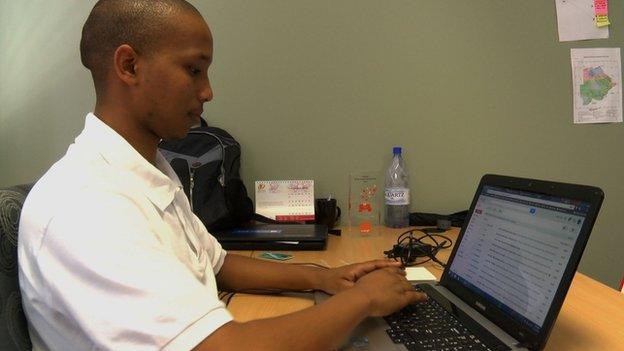
Thuto Gaotingwe has developed his app at an incubation centre for entrepreneurs
Known as a "quasi government institution", the innovation hub is described on its website as part of the state's "national strategic goal for the diversification of the country's economy… set up to support new ventures and existing companies."
Modisar is a productivity software application that can be installed on a farmer's computer or laptop, and allows the farmer to capture information about his or her farm faster.
Mr Gaotingwe explains: "We are trying to say, 'look you can make money off livestock farming, only if you do it the right way'.
"So we have built Modisar, and it allows farmers to keep records of his farm assets. Then it allows farmers to know more about livestock diseases."
Although criticised for being reactive as opposed to proactive, the government has implemented a number of policies, strategies and incentive schemes to encourage diversification.
An Economic Diversifiation Drive (EDD), for example, has been implemented to strengthen the private sector.
The EDD plans to leverage the government's purchasing power, estimated at $2.1bn (£1.3bn) per annum, to stimulate local production and consumption by buying from locally based manufacturers and service providers.
Linah Mohohlo also explains that government has also begun exploring diversification options with in mining sector.
"You are now seeing other minerals, such as coal, uranium, copper, nickel coming on-stream," says Ms Mohohlo.
Despite facing obstacles, with the right long-term developmental strategies, Botswana has huge potential to diversify.
- Published11 November 2024
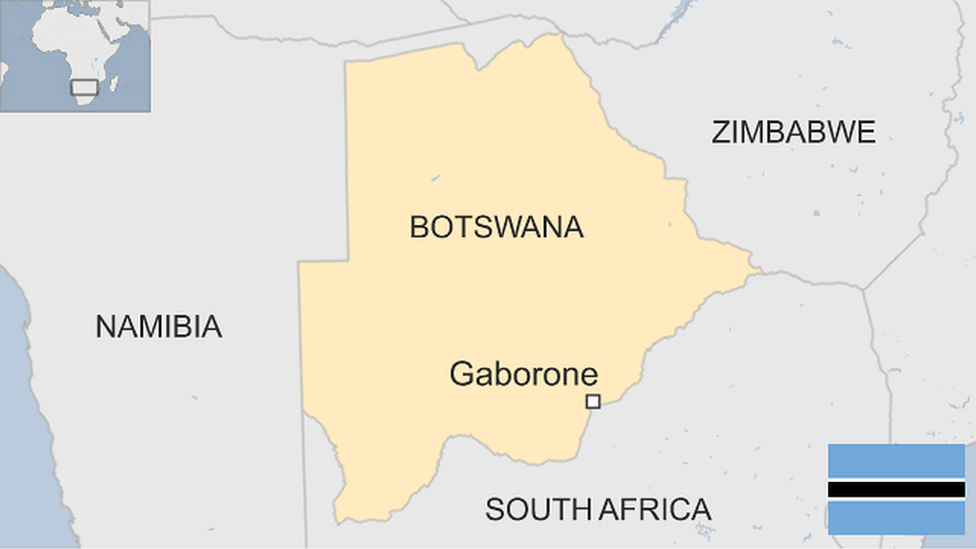
- Published26 October 2014
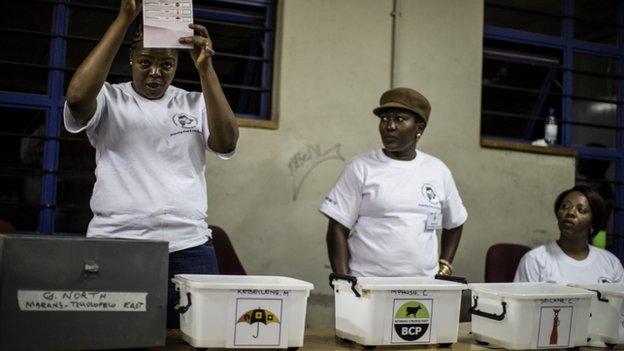
- Published4 July 2014

- Published21 August 2013
